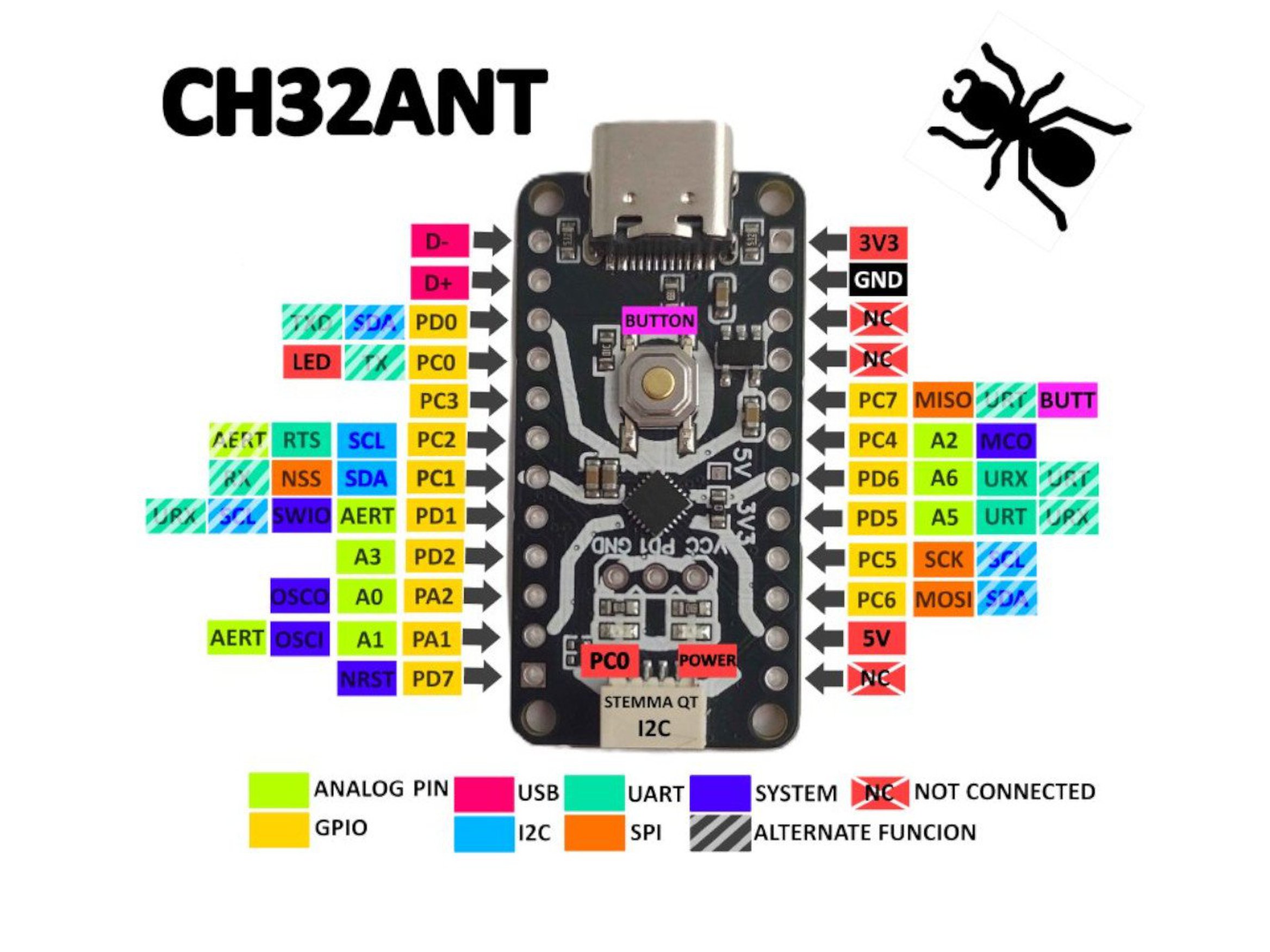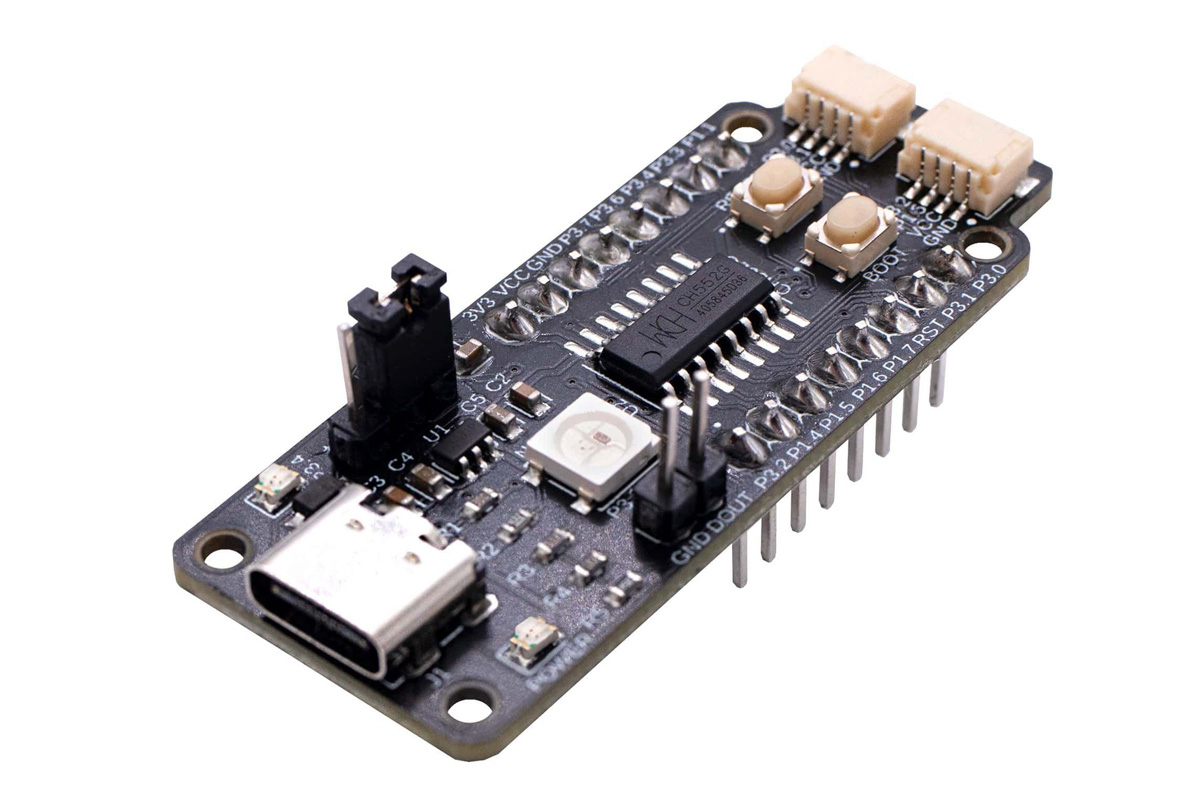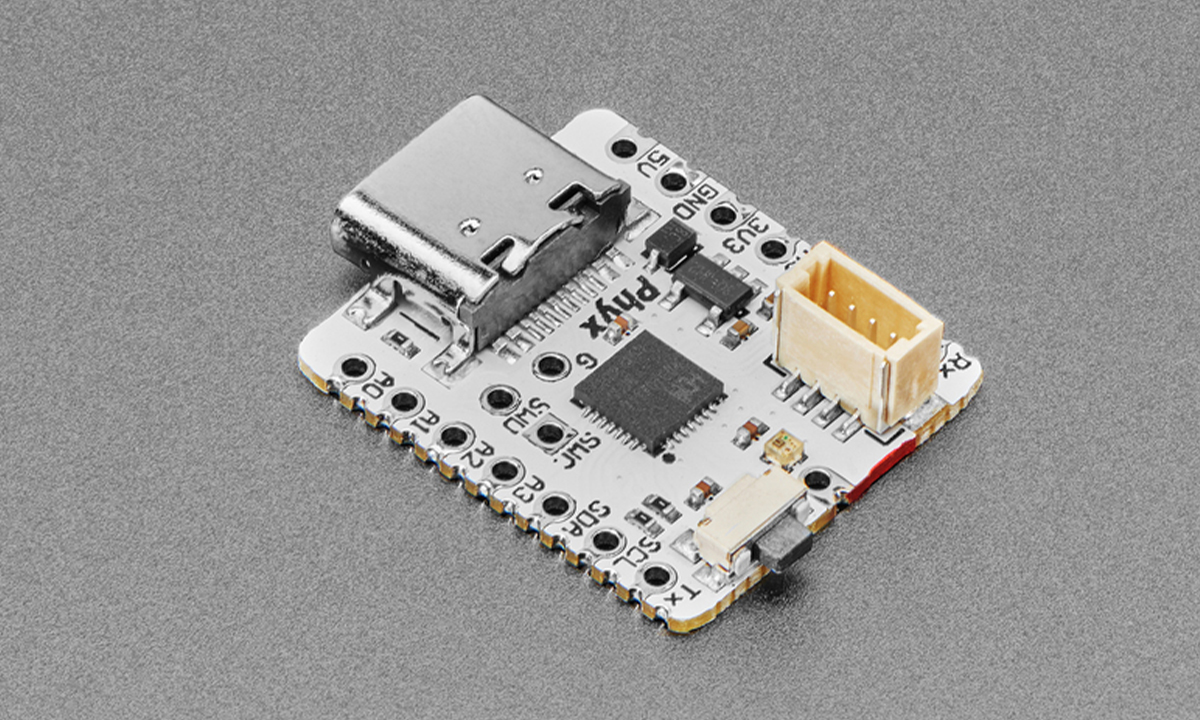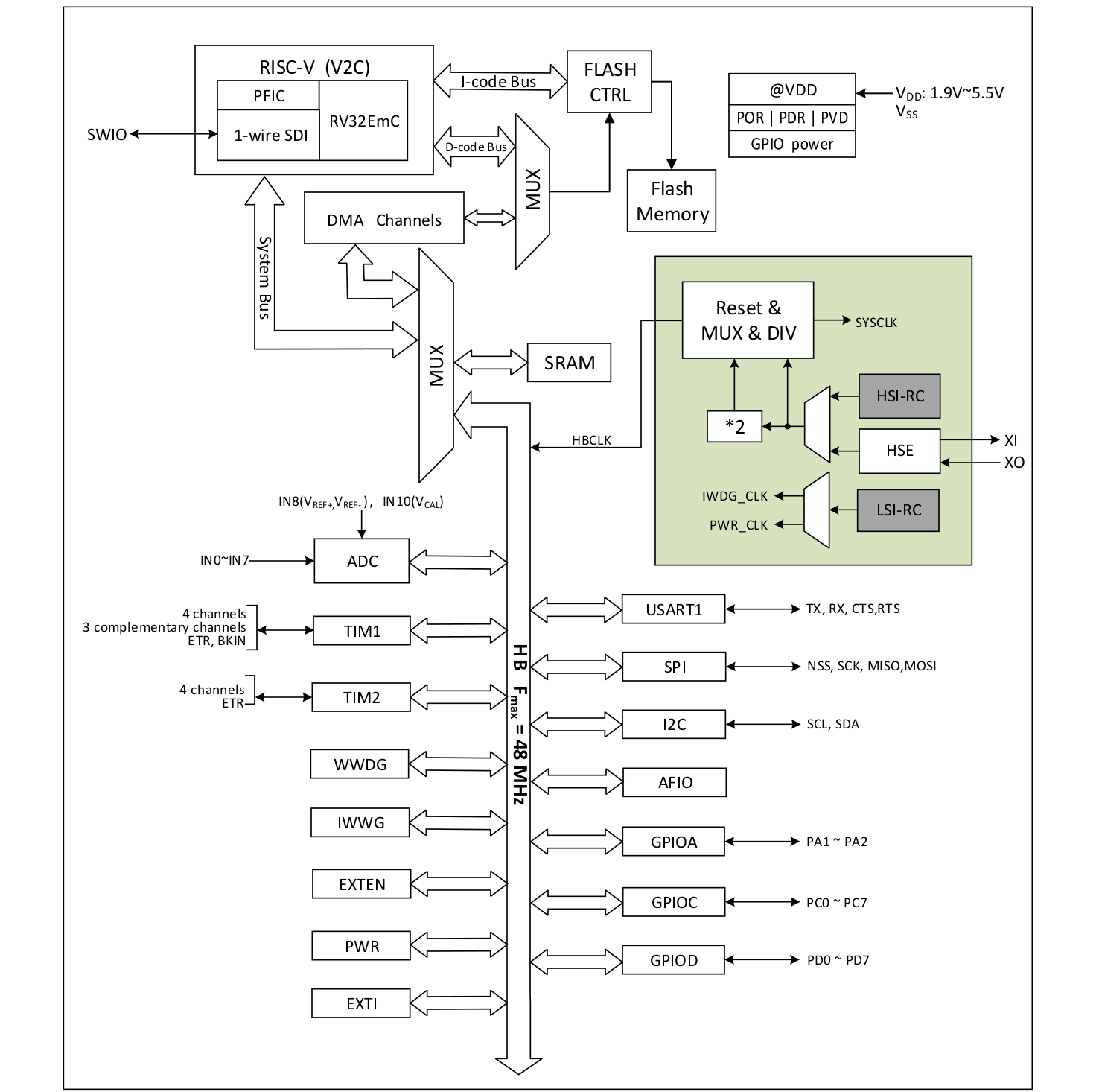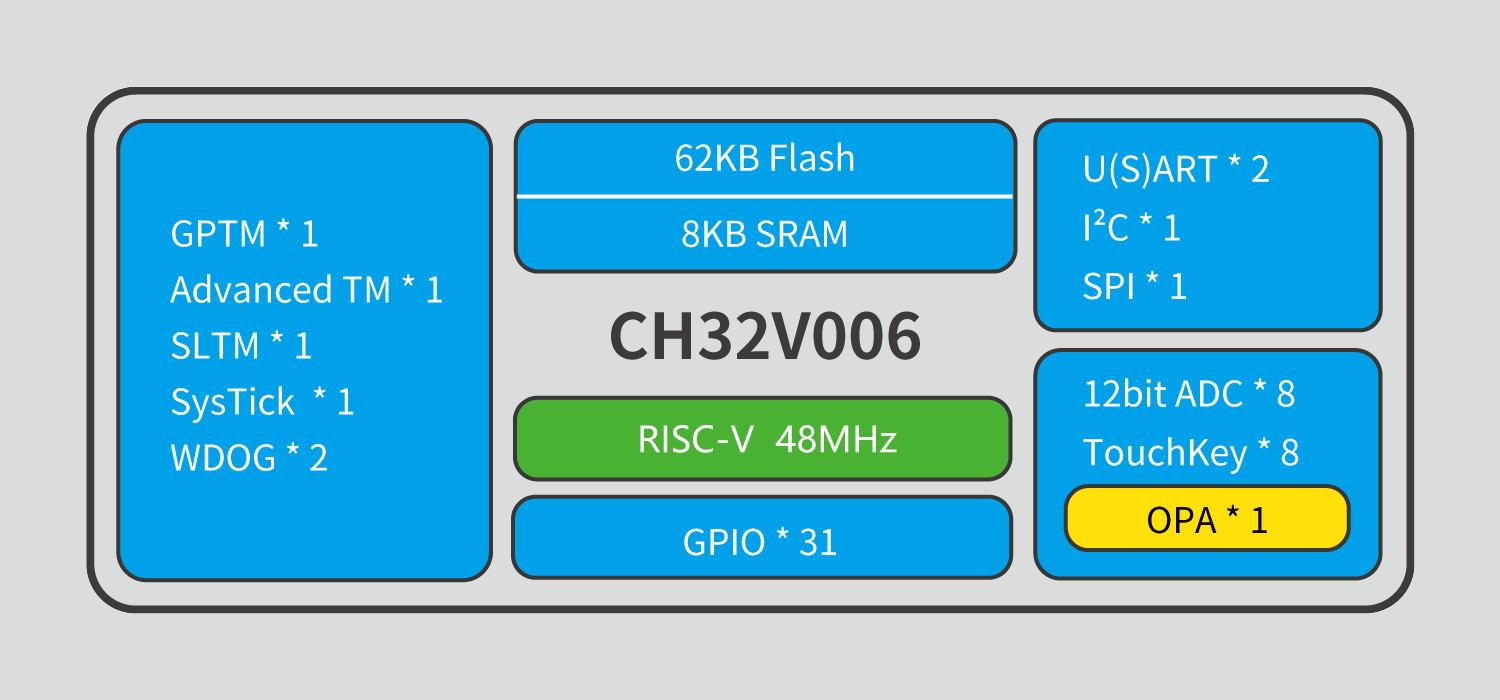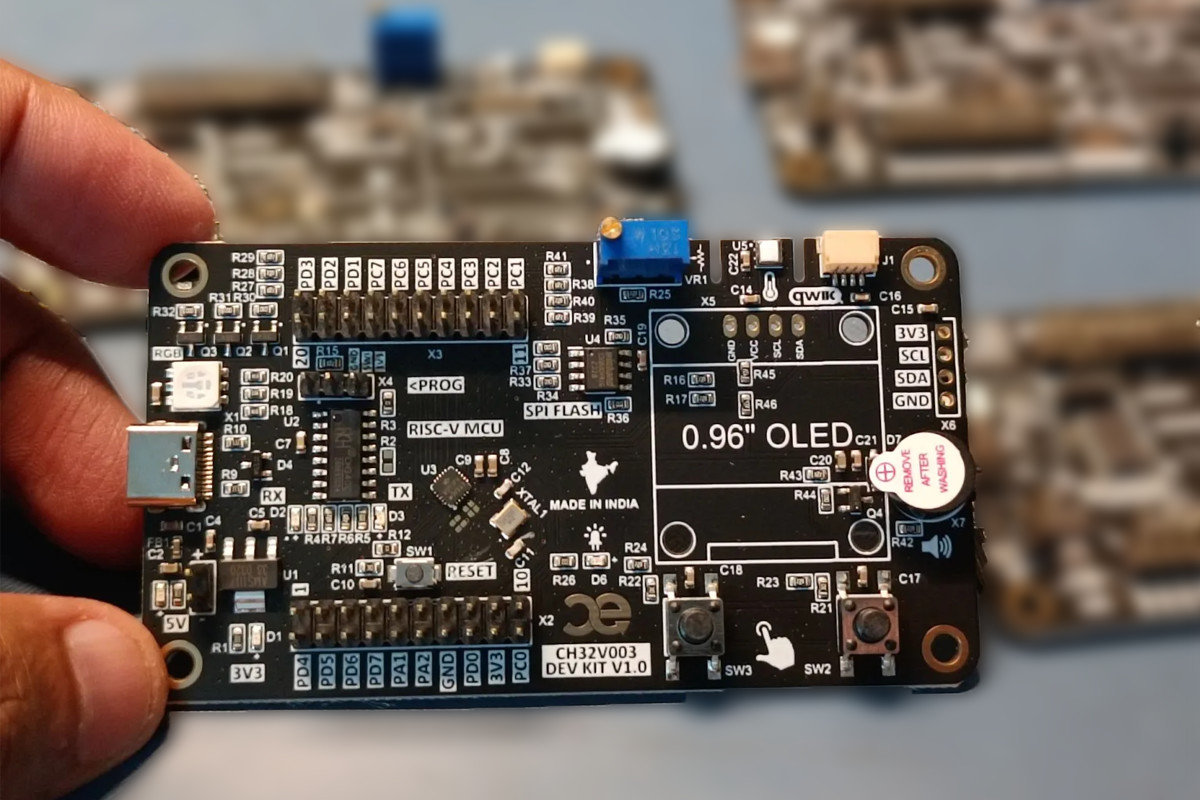The CH32-Ant is a low-cost, breadboard-compatible development board powered by the WCH Electronics CH32V003-F4U6 RISC-V microcontroller, ideal for prototyping. It is pin-compatible with Prokyber’s ESP32-C6-Bug, offering an easy transition for users who don’t need wireless capabilities or the higher performance of the ESP32-C6FH4. The board features a Stemma QT connector for straightforward I2C sensor integration and a USB Type-C port that supports data transfer and power through software-based USB on the CH32V003. The CH32-Ant offers configurable logic voltage at 3.3V or 5V, adjusted via an onboard 0-ohm resistor, providing flexibility for sensor projects. Powered by the CH32V003F4U6 microcontroller, it operates up to 48MHz with 2kB of RAM and 16kB of flash, making it cost-effective for applications requiring basic processing without wireless. The CH32-Ant features a compact layout designed for breadboard compatibility, a Stemma QT connector for an I2C module on one end of the board, and a USB Type-C connector […]
$6 Cocket Nova CH552 development board features CH552G 8-bit MCU with an enhanced 8051 core
The Cocket Nova CH552 is a cheap and versatile development board built around the CH552G MCU with an enhanced 8051 core clocked at 24MHz. Designed for beginners and hobbyists, this board features easy USB Type-C programming, onboard LEDs and a Neopixel RGB, reset and boot buttons, and Qwiic/STEMMA QT connectors for easy expansion. Additionally, it gives access to 17 GPIOs, PWM, ADC, and touch button capabilities. These features along with low-cost and standard breadboard compatibility make this development board suitable for learning and experimentation. We have previously written about other products built around the CH552G/T microcontroller, namely a $10 Arduino-programmable keyboard and the Turing Smart Screen 3.5-inch USB Type-C information display. Users interested in inexpensive 8-bit MCU boards may also check out Electrodragon’s CH551 mini development board based on another MCU part of the CH55x family. Cocket Nova CH552 development board specifications: MCU – WCH CH552 8-bit Enhanced USB single-chip MCU […]
Phyx LANA-TNY – A WCH CH32V203 RISC-V development board for embedded applications
The LANA-TNY is a compact development board created by Phyx and built around the CH32V203 RISC-V microcontroller. It offers a low-cost solution for embedded development and features a built-in USB bootloader, eliminating the need for an external programmer to flash the firmware. With a USB-C connector and a minimalist design, the board provides essential components to start development quickly. At its core, the Phyx LANA-TNY is powered by the CH32V203G6U6, a 32-bit RISC-V microcontroller from WCH Electronics, capable of running up to 144MHz with 1-cycle multiply/divide operations. It includes 10KB of SRAM, 32KB of single-cycle Flash, and 224KB of additional external flash for program or data storage, though the external memory operates at a slower speed. The CH32V203 microcontroller supports a range of peripherals, including ADC, timers, USB devices, UART, I2C, and SPI, making it suitable for a wide variety of embedded applications. Designed in the style of Adafruit’s QT […]
Olimex RVPC is a one Euro RISC-V computer kit with VGA and PS/2 connectors
Olimex RVPC is one Euro RISC-V computer powered by a WCH CH32V003 RISC-V microcontroller and equipped with a VGA port for video output and a PS/2 connector to connect a keyboard. You won’t be able to do much with this device as an end-user, but it does not matter since the RVPC open-source hardware board mostly targets the education market and is offered as a kit to be soldered to lower the selling price and to serve as a soldering learning kit. Olimex RVPC specifications: MCU – WCH CH32V003 32-bit RISC-V2A microcontroller up to 48 MHz with 2KB SRAM, 16KB flash (SOP8 package with 6x GPIOs) Video Output – VGA connector (3x GPIO used for Vsync, HSync, and RGB) Keyboard port – PS/2 connector (2x GPIO used) Programmer port – 2-pin header for CH32V003 programming through a board such as ESP32-S2-DevKit-LiPo-USB Misc – Buzzer (1x GPIO) and Red power LED […]
WCH CH32V002 32-bit RISC-V MCU comes with 4KB SRAM, supports 2V to 5V DC supply voltage
WCH CH32V002 is an industrial-grade general-purpose 32-bit RISC-V microcontroller that is pin-to-pin compatible with the popular CH32V003 MCU with 4KB SRAM instead of 2KB, a wider input voltage range from 2V to 5V, and other improvements. Earlier this month we wrote about the WCH CH32V006 RISC-V microcontroller that offers an upgrade to the CH32V003 with more I/Os, memory, and storage, requiring a new PCB layout. But now, the Chinese company has unveiled a pin-compatible alternative with the CH32V002 that adds more SRAM, uses the new V2C core with RV32EmC instruction set (also used in the CH32V006), offers a larger bootloader and configuration memories, upgrades the ADC to 12-bit, and adds support for 8-channel touch-key channel detection. WCH CH32V002 specifications (highlights in bold show differences against the CH32V003): CPU – 32-bit “RISC-V2C” core up to 48 MHz using RV32EmC instruction set Memory – 4KB SRAM Storage – 16KB flash, 3328 Bytes […]
WCH CH32V006 RISC-V microcontroller adds more I/Os, memory, and storage compared to CH32V003
WCH CH32V006 RISC-V microcontroller is an upgrade to the 10-cent CH32V003 microcontroller with more I/Os, up to four times the memory, storage, a wider supply voltage range, the addition of a TouchKey interface, as well as a new 32-bit V2C RISC-V core instead of the V2A core found in the CH32V003. More specifically that means we went from the CH32V003 with 2KB SRAM and 8KB flash, up to 8KB SRAM and 62KB for the CH32V006, and 6KB SRAM and 32KB flash for the CH32V005, a smaller sibling of the new RISC-V microcontroller. WCH CH32V005 & CH32V006 specifications (with highlights in bold to show differences against CH32V003): CPU – 32-bit “RISC-V2C” core up to 48 MHz Memory – 6KB SRAM (CH32V005) or 8KB SRAM (CH32V006) Storage – 32KB flash (CH32V005) or 62KB flash (CH32V006) Peripherals Up to 31x GPIO with interrupt support (CH32V003 had up to 18x GPIO) 2x USART interfaces […]
BitNetMCU project enables Machine Learning on CH32V003 RISC-V MCU
Neural networks and other machine learning processes are often associated with powerful processors and GPUs. However, as we’ve seen on the page, AI is also moving to the very edge, and the BitNetMCU open-source project further showcases that it is possible to run low-bit quantized neural networks on low-end RISC-V microcontrollers such as the inexpensive CH32V003. As a reminder, the CH32V003 is based on the QingKe 32-bit RISC-V2A processor, which supports two levels of interrupt nesting. It is a compact, low-power, general-purpose 48MHz microcontroller that has 2KB SRAM with 16KB flash. The chip comes in a TSSOP20, QFN20, SOP16, or SOP8 package. To run machine learning on the CH32V003 microcontroller, the BitNetMCU project does Quantization Aware Training (QAT) and fine-tunes the inference code and model structure, which makes it possible to surpass 99% test accuracy on a 16×16 MNIST dataset without using any multiplication instructions. This performance is impressive, considering […]
CAPUF Embedded CH32V003 RISC-V Dev Kit features USB-C, temperature/humidity monitoring, OLED & more
CAPUF Embedded CH32V003 Dev Kit is an all-in-one development board with a USB-C interface, onboard sensors (temperature/humidity), an OLED display, SPI NOR Flash, and ample I/O options. Additionally, it features a Qwicc connector, an RGB LED, and a 3-pin header to connect the WCH-link programmer providing further flexibility for your projects. After the initial release of this “10 cents” CH32V003 RISC-V microcontroller, we have seen $1.5 development boards and an open-source GGC toolchain, as well as Arduino support for the WCH RISC-V microcontrollers. Very recently, CNLohr even managed to transmit LoRa packets with this MCU. CAPUF Embedded CH32V003 Dev Kit Specifications: MCU – WCH CH32V003F4U6 32-bit RISC-V2A microcontroller up to 48 MHz with 2KB SRAM, 16KB flash (QFN20 package) USB – 1x USB-C Port for Power (5V) and Serial Interface with onboard USB to UART converter I/Os – 20 Pin MCU IOs with USART, I2C, SPI, ADC Program & Debugging – […]


